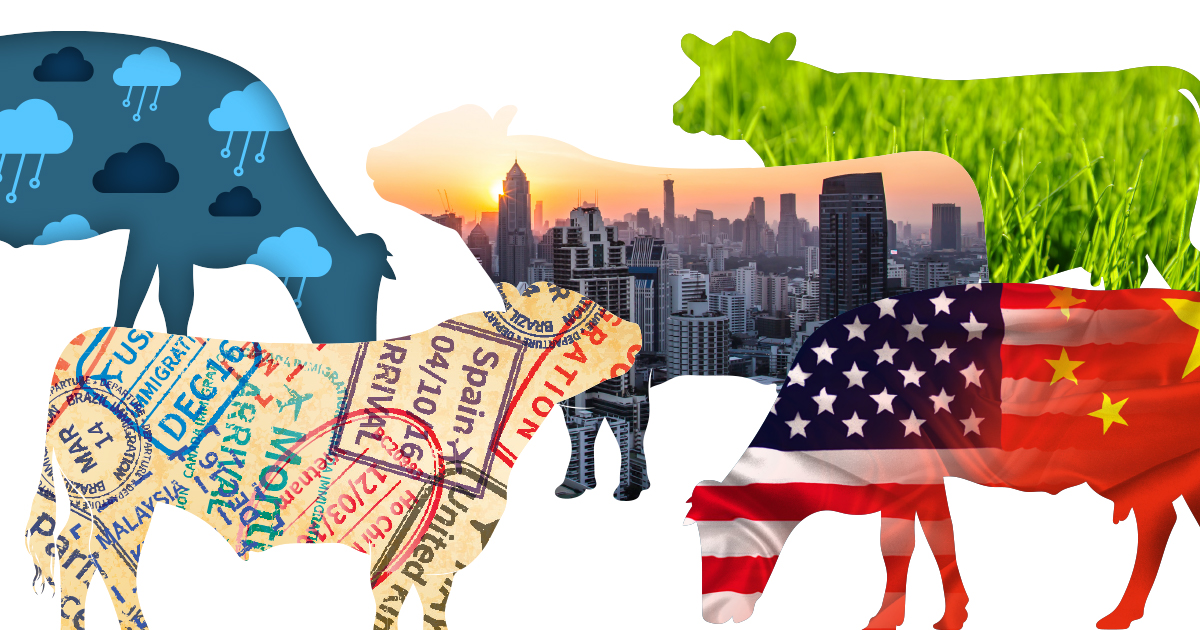AB Direct - Steers
Rail: 520.00 del
AB Direct - Heifers
Rail: 520.00 del
US Trade- Steers
Rail: ---
US Trade - Heifers
Rail: ---
Canadian Dollar
0.06

Top 5 things to watch in agriculture
Shaun Haney from Real Agriculture recently spoke at Canada’s Outstanding Young Farmers national virtual event. He reports on the latest industry news and speaks with farmers and ag specialists about all facets of agriculture. Here’s a recap of the top trends he sees in agriculture.
1. Rural vs Urban
The divide between rural and urban continues to get wider and is impacting the agricultural industry. Even Calgary and Edmonton are becoming more metro as their populations grow in size. As Haney says, you just have to look at the political map of Canada to see the division. With a locked-in rural vote our country faces political challenges. Urban votes matter and have an impact on policies and priorities. One example is the National Food Policy. There are many issues surrounding the rural vs urban divide including public trust, how to define sustainability, and urban sprawl taking away farmland.
One of the largest issues may be rural broadband. Haney says our rural communities are at a disadvantage – large geography and a sparse population are real obstacles. This issue has been exacerbated due to COVID. With Zoom calls, digital meetings and teaching kids from home, there is a great demand to have reliable, secure access to the Internet.
There is a potential for fibre-like speeds, but it requires a hardware investment. Western Canada does not have the infrastructure needed, and we can’t rely on the federal government to figure it out. Haney sees opportunities for the private sector and partnerships. He suggests keeping an eye on low Earth orbit (LEO) satellite broadband from companies like Starlink (Tesla owner Elon Musk) and Telesat (Canada’s biggest satellite operator).
In today’s world, business cannot function without the internet. Haney sees access to rural broadband as an important component of strong rural communities. Just as important a service as having rural doctors and local stores, it’s important to attract people to small towns, and necessary to operate home business and optimize precision ag.
2. Immigration
Labour shortage is a real problem in agriculture. With a massive shortage of farm labour at all skill levels, farmers are asking themselves “Who will do the work?”
We’ve been tracking a labour shortage for quite a few years, and what’s troubling is when we started this issue, we noted that (back in) 2004, the (agriculture) industry was short 30,000 workers, and moving forward into 2014 and now based on numbers we just released, in 2018, we’ve seen a doubling of those numbers in that 10-year period. When we do projections to 2029, we see it doubling again to 123,000 workers short, so this is really concerning.
It’s easy to attract people to positions like scientists, executives, and sales, but the challenge lies with securing seasonal workers. One way to address this immediate need is through immigration.
When we step back and look at the bigger picture, it’s not just about bringing in temporary workers. Overall, there is a lack of immigration to rural areas. How can we attract workers and keep them? Haney says rural communities need services and infrastructure to be able to support these growing populations.
3. US/China Battle
There is a fight for global dominance and China is expected to be the global economic leader by 2050. The complex relationship between China, US and Canada continues to evolve. Haney refers to this dynamic as a three-legged stool with Canada caught in the middle.
China is buying a lot of agricultural commodities, but we have a tense relationship with them because of so many political issues – like trade, human rights, cyber security, and intellectual property rights. Although these issues are outside of ag, they are important to be aware of. As Haney says, “Usually agriculture is one of the first things impacted when a relationship amongst foreign powers goes astray.”
4. Digitization/Electrification
Digitization is a trend that will see more robotics and autonomy in agriculture – especially as we struggle to find people to work on the farm. Haney says this will help address labour shortages, improve productivity, while generating endless streams of data. We tend to focus on output a lot, but what is often forgotten is the benefit of collecting data as the robot does the work.
There are some challenges to face with digitization – it must be cost competitive, we need to learn a new set of skills, and we need to find the ROI.
Skills are changing and the way we operate equipment is changing. Dairy farmers are ahead of the game with robotic milkers and feed pushers. A combine with no steering wheel is technology that is not far away.
Electrification is controversial in farm communities. Farmers are also mechanics and like to fi x stuff but are typically not electricians. Over the last six years Haney has seen a massive move to electrification and says the benefits are real from 100% torque, to equipment horsepower requirements, to accessing real-time data. Electric farm vehicles are coming very fast.
5. Environmental Policy
Environmental policy is a trend that is full speed ahead. Now that Biden is in power Haney sees Canada and the US battling it out to see who is most environmentally responsible.
Canada’s climate plan is the federal government’s new major plan for addressing climate change. It involves agriculture, and one area most impacted will be the Clean Fuel Standard. Haney says farmers need to pay attention to the land use requirements.
He says we’re trying to find our place in the climate conversation and mentioned that the Canadian Roundtable for Sustainable Beef is a massive success story in terms of how an industry can rally and create a program to show what they do and how they are sustainable.
This article was first published in Volume 1 Issue 1 of ABP Magazine (February 2021). Watch for more digital content from the magazine on ABP Daily.

